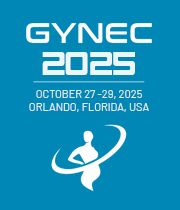Saumya Pandey, Indira-IVF Hospital, India
Objectives: Inflammation is a hallmark of HPV-mediated cervical cancer; Matrix metalloproteinase [MMP]-2 and tissue inhibitor of metalloproteinase [TIMP]-2 are emerging as pivotal players in inflammation and carcinogenesis. My study aimed to evaluate the role of MMP-2 (-735C>T [....] » Read More


![Impact of matrix metalloproteinase [MMP]-2 (2735C>T) and tissue inhibitor of metalloproteinase [TIMP]-2 (2418G>C) gene polymorphisms with human papillomavirus-mediated cervical cancer: Emerging trends in Gynecologic Oncology Speaker at Gynecology Conferences - Saumya Pandey](https://gynecology.magnusconferences.com/uploads/speakers/saumya-pandey-6939.jpg)









Title : Application of thread technology in aesthetic and functional gynecology
Marlen Sulamanidze, Total Charm Clinic, Georgia
Will be Updated Soon...
Title : Inositol in treating sub fertile women and Adolescents with PCOS
Lalit Bora, Obstetric and Gynaecological Societies of India, India
Polycystic ovarian disease is one of the most common endocrine disorders affecting women of reproductive age and adolescents. It doesn’t spare even perimenopausal women. PCOS is the most common cause of anovulatory infertility in women. The global prevalence of PCOS varies [....] » Read More
Title : Role of artificial intelligence in the diagnosis and management of endometriosis. The prospect of the future
Mohamed Hosni, London North West University Hospitals, United Kingdom
Endometriosis affects approximately 10% of women worldwide, causing significant pains, infertility, and reduced quality of life. Despite its prevalence, the condition is notoriously underdiagnosed, with an average delay of 7-10 years between symptom onset and diagnosis. Current d [....] » Read More
Title : Recognizing and supporting survivors: The role of gynecologists in addressing the physical and emotional impact of sexual assault
Carrie Eutizi, Arizona Coalition to End Sexual & Domestic Violence, United States
Sexual assault is a deeply traumatic experience with far-reaching physical, emotional, and psychological effects. Gynecologists often serve as critical points of contact for survivors, providing care that extends beyond medical treatment to encompass emotional support and advocac [....] » Read More
Title : Exercise Intervention for women following chemotherapy for ovarian cancer
Deirdre Mc Grath, Queen's University Belfast, United Kingdom
Reluctance of women following treatment for ovarian cancer, to take part in exercise is a global health issue negatively effecting health outcomes. The study aim was to develop, implement and evaluate an approach to optimise the implementation of an exercise intervention for wome [....] » Read More
Title : Navigating women’s health: challenges, solutions and beyond.
Okonta Rosemary Theresa, Oskar Kammer School, Germany
Women represents 50% of the population globally and 80% of purchasing decisions in healthcare are made by women. It is a common knowledge that women feel a pressure to be a “superwoman”- women feel the pressure to manage and juggle across all aspects of their life(inc [....] » Read More
Title : Health-related quality of life among Iranian women with Uterine Fibroids: A cross sectional study
Zahra Ghasemi, Shahid Beheshti University of Medical Sciences, Iran (Islamic Republic of)
Objective: Uterine fibroids (UFs) are the most common benign tumors in women, and their prevalence varies between 5.4 and 77.0% in reproductive-aged women. Patients with UFs may experience severe symptoms that they can affect different aspects of their lives, including quali [....] » Read More
Title : Cervical adenomyoma in the philippines: A rare case
Ana Kristina M Gloda, Makati Medical Center, Philippines
Cervical adenomyomas are rare benign lesions characterized by endocervicaltype glands and stroma, presenting typically as polypoid masses within the uterine cervix. This case report presents as one of the first documented instance of cervical adenomyoma in the Philippines, emphas [....] » Read More
Title : Changing structure of the surgical neck of humerus in Chinese postmenopausal women
Yeming Wang, Tianjin First Central Hospital, China
Introduction: The anatomical distribution of cortical bone in the surgical neck of the humerus may be essential in determining resistance to fracture. The aim of the study is to investigate the spatial distribution differences in cortical bone, and the effects of aging and m [....] » Read More
Title : Genital warts in pregnancy diagnosis and treatement the most common cause of laryngeal paillomatosis in children under 10 years old
Igor Jeremic, HPV Diagnostic Center, Serbia
Problem Statement: HPV infection is an epidemic of modern age with the highest number of infected girls between 18 and 30 years of age and the most common diagnosis are genital warts in early or developed stage at first born women .Due to t [....] » Read More
Title : Transforming ovarian cancer care: AI innovations in early detection, overcoming challenges, enhancing patient safety, and promoting health equity
Moufiq Abdulrasoul Hasan Aboulqassim, Abdullah Thafer Hospital, Libyan Arab Jamahiriya
Background: Ovarian cancer remains a significant challenge in gynecological oncology due to its often late diagnosis and complex treatment pathways. Recent advancements in artificial intelligence (AI) offer promising avenues for early detection, improved patient safety, and equit [....] » Read More
Title : Demystifying the role of gender-sensitive healthcare in african healing practices
Muhammad Naveed Ashraf, University of Sialkot, Pakistan
This presentation examines the intersection of gender, health, and healing practices in African history, inspired by Rebekah Lee’s Health, Healing, and Illness in African History. It delves into how gender dynamics influenced access to healthcare, the roles of women in indi [....] » Read More
Title : Comparing in-person and phone translation services for spanish-speaking patients
Swati Kumari, BronxCare Health System, United States
Effective communication is vital for high-quality patient care, especially for non-English-speaking populations. This study examines the impact of translation services on patient satisfaction and communication effectiveness, aiming to extend our impact on population and community [....] » Read More
Title : Delivery modalities and challenges in cerebral palsy patients: A case study
Cristina Cardenas, BronxCare Health System, United States
Cerebral palsy (CP) presents unique challenges during pregnancy and delivery due to associated motor impairments, comorbidities, and sensory deficits. As medical advancements increase the number of women with CP reaching childbearing age, tailored obstetric care becomes essential [....] » Read More
Title : A Rare case of uterine embryonal Rhabdomyosarcoma in an old patient
Salma Moustafa, BronxCare Health System, United States
Background: Uterine embryonal rhabdomyosarcoma is an aggressive mesenchymal tumor that is exceptionally rare in adult patients. Due to its infrequent occurrence, there are no standardized guidelines for its diagnosis and management. Case: A 57-year-old woman presented with worse [....] » Read More
Title : Surgical management of endometriosis in a community hospital of a low socioeconomic area
Salma Moustafa, BronxCare Health System, United States
Study Objective: To evaluate the perioperative and long-term outcomes of surgical management for patients with endometriosis at a community hospital in a low socioeconomic area. Design: Retrospective case series study. Setting: Academic medical center. Patients: Women who unde [....] » Read More
Title : Meta-analysis of differentially expressed genes in PCOS
Lauren V Cervantes, University of Central Florida College of Medicine, United States
Background: Polycystic Ovary Syndrome (PCOS) is among the most prevalent endocrine disorders affecting reproductive-age females, with a global prevalence of 6-10%. It is characterized by hyperandrogenism, ovulatory dysfunction, and/or the presence of polycystic ovaries. Common cl [....] » Read More
Title : Investigation of OAS1, OAS3, and other differentially expressed genes in cervical cancer
Samantha Hsu, University of Central Florida College of Medicine, United States
Introduction: Cervical cancer (CC) is the fourth most common cancer among women, with approximately 604,000 new cases diagnosed annually worldwide. It is caused predominantly by high-risk strains of human papillomavirus (HPV), which inactivate tumor suppressor gene function. Adva [....] » Read More
Title : Assessing women’s health day as a community based education model
Natalie Geis, Florida State University College of Medicine, United States
Background: University students face significant challenges in maintaining healthy behaviors due to financial constraints, time limitations, and inadequate access to healthcare. Community-based health events provide an accessible platform to educate students on key health domains [....] » Read More
Title : An audit of timelines for women presenting to outpatient hysteroscopy services with postmenopausal bleeding
Mahrukh Mumtaz, Royal College of Physicians of Ireland, Ireland
Background: Outpatient hysteroscopy is an invaluable tool for investigations and management of postmenopausal bleeding. Since June 2021 University Hospital Waterford runs a “one-stop-shop” where women have an ultrasound, a hysteroscopy, biopsy or removal of polyp if i [....] » Read More
Title : First trimester placenta accreta with myoma in a nullipara: A case report
Ma Catherine Grace Reyes, University of Santo Tomas Hospital, Philippines
Detection of placenta accreta spectrum (PAS) disorder in the first trimester is rare and challenging, and a consensus on its diagnostic criteria is lacking. When left undetected, it may lead to obstetrical hemorrhage that may necessitate hysterectomy. This is a case of a 35-year- [....] » Read More
Title : Knowledge of gestational diabetes mellitus among pregnant women in a tertiary hospital in marawi city lanao del sur
Al Jazarie Umpa Masacal, Amai Pakpak Medical Center, Philippines
Gestational diabetes mellitus (GDM) is a common pregnancy complication that can have detrimental effects on both the mother and the baby. In the Philippines, addressing GDM is not just about managing pregnancy-related conditions; it’s a strategic opportunity for preventin [....] » Read More